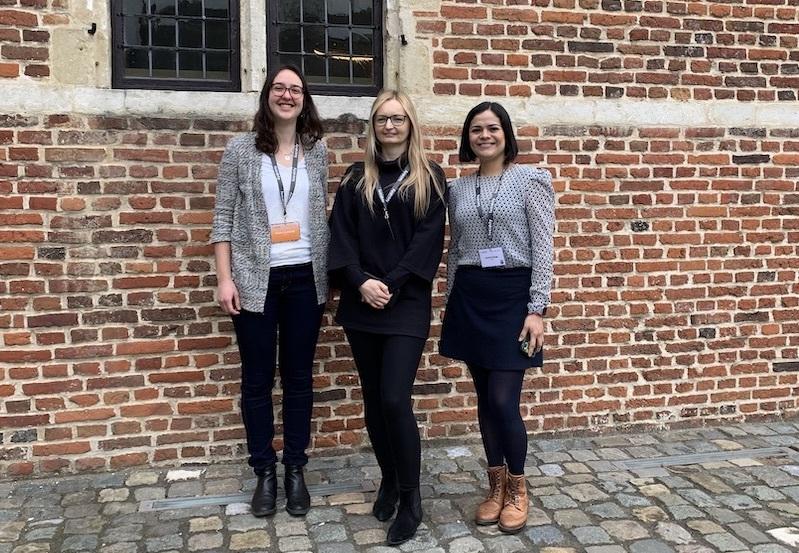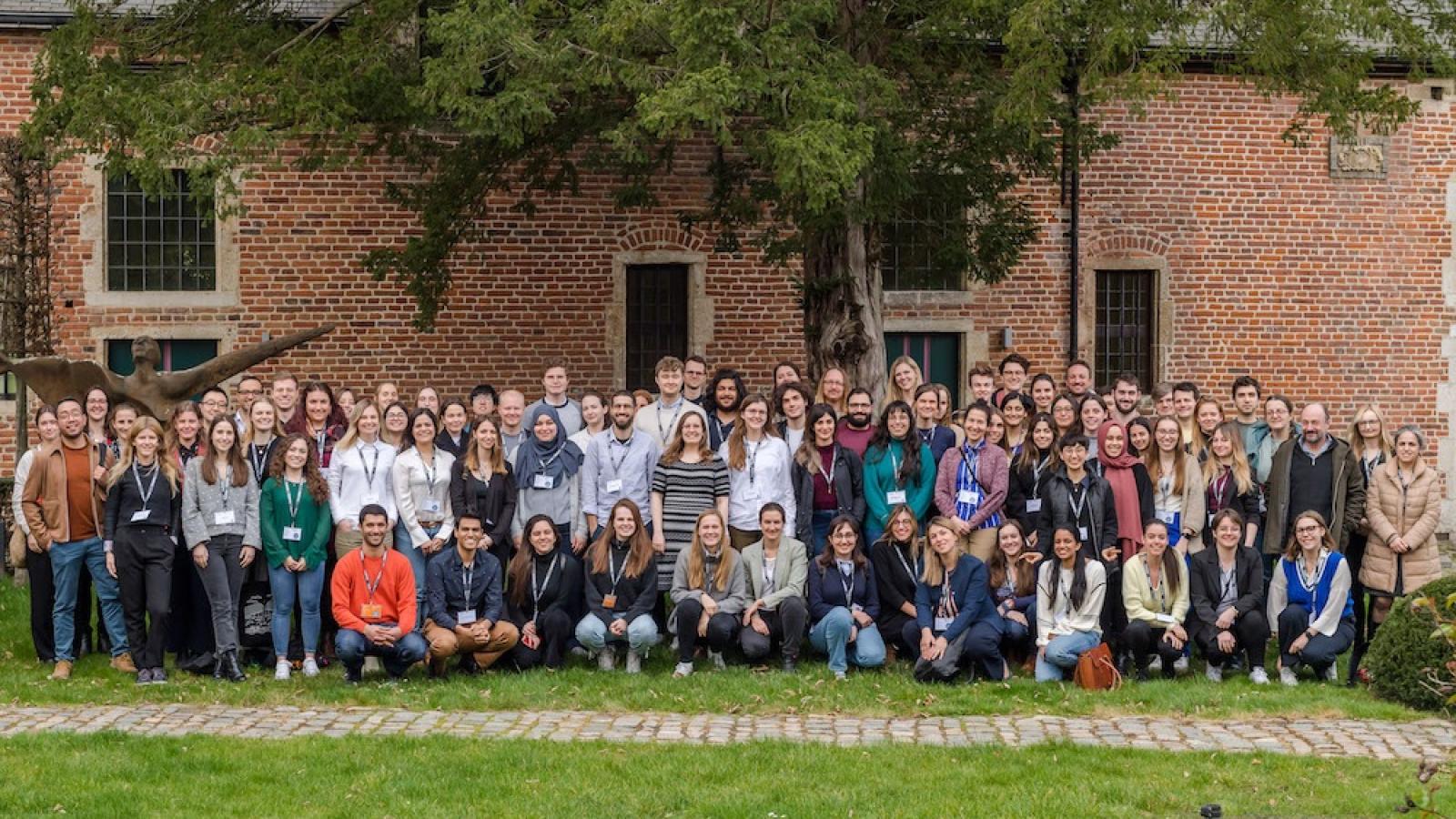It was a busy start to 2023 for the European alliance for neurodegenerative research, CURE-ND, coming together and strengthening ties for a clinical workshop, an ECR meeting and a symposium at the British Neuroscience Association’s Festival of Neuroscience.
Clinical workshop, Paris
In February, researchers from the four CURE-ND institutions (UK DRI, DZNE, the Paris Brain Institute and Mission Lucidity) convened in Paris for a two-day clinical workshop. Researchers gave talks focusing on clinical trial platforms, digital assessments and digital biomarkers and preventative trials for genetic diseases.
Congratulations to Dr Arpan Mehta (UK DRI at Edinburgh), awarded the prize for best talk, and Georgina Lockwood-Taylor (Imperial College London) who won the best poster award.
Dr Mehta said:
"The clinical workshop was a fantastic opportunity to learn about cutting-edge clinical research and clinical trials in neurodegenerative diseases going on across Europe. It was great to present our work on the MND SMART trial, exchange ideas and compare notes and, most importantly, establish new links for future collaborations. I was very inspired by the breadth of research presented, and am grateful to the organisers for an excellent meeting.
Early Career Researcher (ECR) meeting, Leuven
After a very successful inaugural event in London last year, the second annual CURE-ND workshop for ECRs took place in Leuven in March. ECRs from across the four institutions came together discuss and share ideas, in an excellent opportunity to network and get involved in the joint effort to accelerate the pace of scientific discovery in the field of neurodegenerative diseases. Prof Bart De Strooper (UK DRI at UCL) gave a fantastic keynote speech on the topic of 'Alzheimer's disease: Hope for better treatments'. We caught up with three researchers who attended the meeting: Dr Carmen Arteaga Reyes (UK DRI at Edinburgh), Dr Wiola Zelek (UK DRI at Cardiff) and Dr Marijne Vandeburgh (Mission Lucidity).
Why did you want to attend the CURE-ND ECR workshop?
Carmen: It felt like an excellent opportunity to meet other ECRs with a shared passion for neurodegenerative diseases, exchange experiences across European centres, and build upon new collaborations.
Wiola: To meet colleagues across Europe who shared my interests and start new collaborations.
Marijne: I attended the first CURE-ND workshop for early career researchers in London in 2022. At this workshop, I was impressed by the high quality of science and helpful networking opportunities. Hence, when they were looking for a new organising committee, I did not hesitate to volunteer as it offers a great opportunity for early career researchers to get acquainted with the organisation of an international workshop.
What did you enjoy most about the meeting?
Carmen: I enjoyed having enough time to ask questions and discuss in detail with my peers. I found some fascinating work on imaging methods and patient monitoring that would interest our research group.
Wiola: The sessions on translational research were what I found to be the most exciting. The keynote talk was very inspiring and hopeful for future Alzheimer's treatments. The field is advancing rapidly, and I think we will soon have novel drug candidates that can cure the disease.
Marijne: As an organizer, witnessing the engagement from the participants and speakers, with lots of interactions, was the cherry on the cake. Personally, it provided me with the necessary confidence to speak to a large audience, act as moderator and ask questions to the speakers; I hope to bring these skills with me to future events.
What do you think is the value in bringing together researchers from different countries in this way?
Carmen: It helped me think about which skills from neurodegenerative disease research areas different from mine can apply to my field. For instance, ECRs in DZNE are similarly approaching Alzheimer’s disease as I am in Cerebral Small Vessel Disease (SVD). Furthermore, ECRs from Paris Brain Institute are using different methods and techniques in Parkinson’s that could be used in SVD. The workshop facilitated knowledge and experience interchange but also inspired me more!
Wiola: Connecting with other ECRs at a similar professional stage was great. We had a couple of workshops throughout the meeting where we could go over our work in greater detail and share ideas. Also, the poster sessions were very engaging and informative.
Marijne: Whereas we all work in the field of neurodegeneration, the specific research questions and methodologies used might differ. Doing research is challenging from time to time. Bringing researchers from different sub-fields and institutes together offers new views and perspectives on the research we do.

at the ECR meeting (left to right)
BNA Festival of Neuroscience 2023, Brighton
Delayed by the pandemic, the British Neuroscience Association’s (BNA) biennial conference was back with a bang this year and, as billed, provided a true ‘Festival of Neuroscience’ over four days in April. For the first time, the CURE-ND alliance hosted a joint session, exploring single cell- and organoid approaches for studying neurodegeneration.
- Giles Hardingham, UK DRI at Edinburgh, UK: Glia-neuronal interactions in Alzheimer's disease (co-chair)
- Wei-Ting Chen, VIB - KU Leuven Center for Brain and Disease Research, Belgium: Exploiting spatial transcriptomics to understand Alzheimer's disease (co-chair)
- Benjamin Galet, Paris Brain Institute, France: Lineage-specific molecular profiling in organoid models of Alzheimer's Disease
- Michela Deleidi, formerly DZNE, Germany, now Institut Imagine: Glucocerebrosidase and Brain Disease: Novel Functions Beyond the Lysosome
We were delighted with the huge turn-out for this morning session in the main hall. The presenters provided an excellent overview of the field to the broad neuroscience audience, and their cutting-edge research showed how this rapidly advancing area is closing the knowledge gap in neurodegeneration. Away from the symposium it was wonderful to speak with so many researchers and organisations from across the international neuroscience landscape, discussing how their unique perspectives could contribute to a coordinated effort in dementia research.
In the latest Centres of Excellence in Neuroscience funding call, three grants were awarded to CURE-ND partners:
Reducing the production of toxic Aβ peptides in Alzheimer’s disease by mutating the APP cholesterol-binding site: a new therapeutic strategy? Marie-Claude Potier and Nicolas Villain (ICM), Henrik Zetterberg (UK DRI at UCL)
Neuronal Tau-RNA interactions in health and disease. Susanne Wegmann (DZNE), Jernej Ule (UK DRI at KCL)
AD-protect: Functional and mechanistic characterization of a new gene protecting from Alzheimer’s disease. Stefan Lichtenthaler (DZNE), Jean-Charles Lambert and Julien Chapuis (Institut Pasteur Lille), with external collaborator Kristel Sleegers (VIB)
The next CURE-ND ECR workshop will take place in Bonn in Spring 2024.
Article published: 8 June 2023
Image credits: © KU Leuven - Geert Vanden Wijngaert
